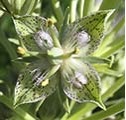Nature Deficit Disorder, and our mental and physical health.
Life does not accommodate you; it shatters you.
Every seed destroys its container, or else there would be no fruition.
-Florida Scott-Maxwell, The Measure of My Days
Who dares to speak the unspeakable is likely to hear,
"That's conspiracy theory." "I don't want to talk about this."
"Right, we're all doomed. Get over it." -Have you heard this before?
Having to repeatedly stuff feelings of overwhelm, despair and defeat
with regard to the rapidly worsening condition of the planet leads
directly to what's known as Nature Deficit Disorder (NDD), a term that
describes the human costs of alienation from nature.
We've seen it all, haven't we? In our lifetime, you and I have been witness to wholesale destruction of...
-the environment by corporate interests, in particular the chemical and mining industries
-the economy by banksters, politicians and mafioso
-our health by physicians and the pharmaceutical and food industries.
But in our politically correct society, we're not supposed to talk
about any of this. The planetary crisis is not a fit topic for polite
conversation, so pieces of the puzzle we carry become a personal burden
that can't be relieved by sharing and rational discussion.
It's hard to find someone willing to discuss symptoms of collapse
objectively; most people either don't have any information to share,
don't believe what they are hearing, or are deep in denial, unwilling
to face the problem. What's often worse is, even if we defend against
this knowledge and harden ourselves to the new reality, it penetrates
deeply into our minds and hearts.
unwilling
to face the problem. What's often worse is, even if we defend against
this knowledge and harden ourselves to the new reality, it penetrates
deeply into our minds and hearts.
Understanding and dealing with emotions is a lifelong task, and our
society and upbringing give little assistance with it. People are
rewarded for suppressing emotions and dissuaded from fully experiencing
or expressing them. This cultural prohibition is a major contributor
to the increase in addictions and the high incidence of depression in
New Zealand society.
It's no secret that environmental (biochemical and geopathic) stressors
influence both our emotions and our behaviour...and, that a major
underlying cause is the relentless impact of development on the
planet. If you're even a mild shade of green, you've been traumatised
at one time or another by a high-impact, human-induced event.
Damage to our bodies from chemical or biological toxins often results
in diminished use of the senses, attention difficulties and higher
rates of physical illness. To add insult to injury, in most cases the
financial costs of long-term treatment have been borne entirely by the
victims--particularly Waitakere, Taranaki and Nelson Bays residents.
My most recent occurred in 2003 when an low-flying aircraft soaked me
to the skin and coated my lungs with a toxic pesticide cocktail; I've
been paying for it ever since.
However, those are simply the visible problems associated with
environmentally induced diseases of the body; the more complex problems
that influence them are well-hidden in the deepest part of the psyche,
where you store stuff you don't ever want to see again. If, for
example, you have directly experienced the transformation of a
favourite environment--even witnessed the removal of much loved trees
for new development--you could be suffering from NDD.
My first experience of NDD came early in life, as pre-schooler watching
with fascination from my living room window as heavy equipment rolled
onto a wooded site across the road. In a matter of weeks, all of the
trees were removed and the view of a beautiful lake was obscured by a
drab 12-story apartment complex.
NDD is both a widespread social trend and a spiritual ailment, and
there are many possible causal agents--forces that undermine a personal
and community sense of identity, belonging and control. These can be
natural disasters, such as drought, fire or flood; also large-scale,
human-induced changes such as war, terrorism, land clearing, or
mining. Something as simple as the loss of a much-loved garden can
become the tipping point that leads to depression and illness.
The symptoms can look quite different, but at the core is a sense of
desolation, i.e. physical pain or sickness caused by a disconnect with
nature that touches you personally. The real crisis is coming through
the mind, affecting the emotions, and it is intensely personal. Ask a
Christchurch earthquake victim how many times they have re-lived their
experience. Ask a dedicated environmental campaigner about their sense
of violation and rage against overwhelmingly destructive forces; it's a
recipe for burnout.
Environmental events can be real, or imagined; millions worldwide are
anxious about some media-hyped unknown disaster lurking on the edge of
darkness. This is causing a huge amount of emotional pain and mental
dysfunction on the planet at this time. Local and global events may
take our thoughts and emotions on a wild ride. If we can't find our
still center and we try to fight the outer world before we calm our
inner world, life feels like a constant struggle.
The intense desire to be organically connected to living landscapes is,
in part, a desire to climb out of our pain by creating a deeper
connection with all living things and life processes on this planet.
Positive outcomes from negative thoughts and experiences can begin with
awareness of the cause of the distress; self-empowerment comes with
acknowledgment of the need to confront our fears.
We can't prevent natural disasters; the only things that we have the
power to change are our emotional response to these events, and our
ability to integrate their meaning into our lives and move on. This is
the gift of resilience: the ability to be grateful for every breath,
even if we have suffered major losses.
Maintaining perspective, equanimity and a positive attitude toward
change may prove to be the pivotal factor in the well-being of
individuals and communities as the systems we rely on fall apart. We
are living through the opening chapters of the end of the world as we
know it, and on the other side of all this will emerge a new world
that's very different from the one we know today. As for the much-hyped
December 2012 "end date", it may be useful to think of it as a
mid-point in the crisis, or perhaps as a trigger date for some further
acceleration of society's rapid unraveling.
As we have seen in Christchurch and elsewhere, the commitment to
cooperate with others, support distressed people and heal distressed
environments is a profoundly healing act; it is by doing something in
service to others that we put our own anxiety and pain in perspective.
In this purification time, all of us are being asked to leave our toxic
emotional baggage behind, improve our personal relationship with the
natural world, and heal our pain for Gaia. Although I use a
combination of brief therapies, I believe the easiest and often most
effective way to let go and move on is with the gentle help of
flowers.
Flower essences are bioenergetic (frequency-based) remedies that have a
positive effect on degenerative (i.e. stress-related, non-infectious)
diseases by stimulating our natural ability to heal, or take
responsibility for our growth. By building a vital bridge between the
physical/mental realms and Spirit through the vehicle of the emotions,
flower essences offer a simple, practical and effective way to release
the emotional component of most health problems, such as anxiety,
exhaustion due to overwork, mending broken hearts, or raising
self-esteem.
take
responsibility for our growth. By building a vital bridge between the
physical/mental realms and Spirit through the vehicle of the emotions,
flower essences offer a simple, practical and effective way to release
the emotional component of most health problems, such as anxiety,
exhaustion due to overwork, mending broken hearts, or raising
self-esteem.
This is my thirty-second year as a practitioner, and I have worked in
five very different country cultures. Contrary to local (NZ) marketing
mythology, it makes no difference what country the flowers are from;
what's important is their efficacy and potency: do they produce
beneficial results? There are more than four hundered different
essences in my repertory, from many parts of the world; each addresses
a specific emotional issue. One that I frequently use for healing
variants of Nature Deficit Disorder is Green Cross Gentian, which
speaks to the soul's relationship to Earth, to our ability to "carry
the cross" for Gaia.
The words from the John Gospel have deep meaning with regard to this
plant, "For He so loved the world that he laid down his life for it."
The Green Gentian flower essence imparts strength to the soul to see
one's destiny in terms of world events, and to not allow the
pessimistic interpretations of the world to dissuade the soul from its
purpose. It awakens the highest, most noble impulses of the soul's
destiny and teaches the value of sacrifice for Gaia and all sentient
beings. Green Cross Gentian can be very helpful when there is doubt,
discouragement or disillusion about our higher destiny, especially with
doubts about how best to serve in the world.
If you understand the meaning of this current time period to be both
purification and gestation, it is important to realise that some
species will become extinct, and some people are not going to wake up.
As a Hopi elder said of this, "If a person does not have the spiritual
eyes to see, it's very hard to show them. Or if they don't have the
ears to hear, it's very hard to speak with them. We wish that we could
go get them all but we can't." People who have been slow to awaken
will soon be forced to find ways of adapting to this new frame of
consciousness.
My personal commitment is to help by preparing people emotionally and
spiritually for the collapse of global industrial civilization;
however, I am aware that nothing is certain as to how any person or
group will fare in the midst of dwindling energy supplies, resource
wars, tipping point climate change, and worldwide economic meltdown.
When it all feels like too much to carry, a brief consultation can give
you insights into your true purpose here, and a few drops of a
well-chosen flower essence will lighten your emotional burden.
Clinic director Bill Watson is a psychologist, T'ai Chi master and
flower essence therapist. A practitioner since 1981, he has conducted
milestone scientific research on the efficacy of flower essences and
treated clients in NZ, the USA, and three Asian countries.









